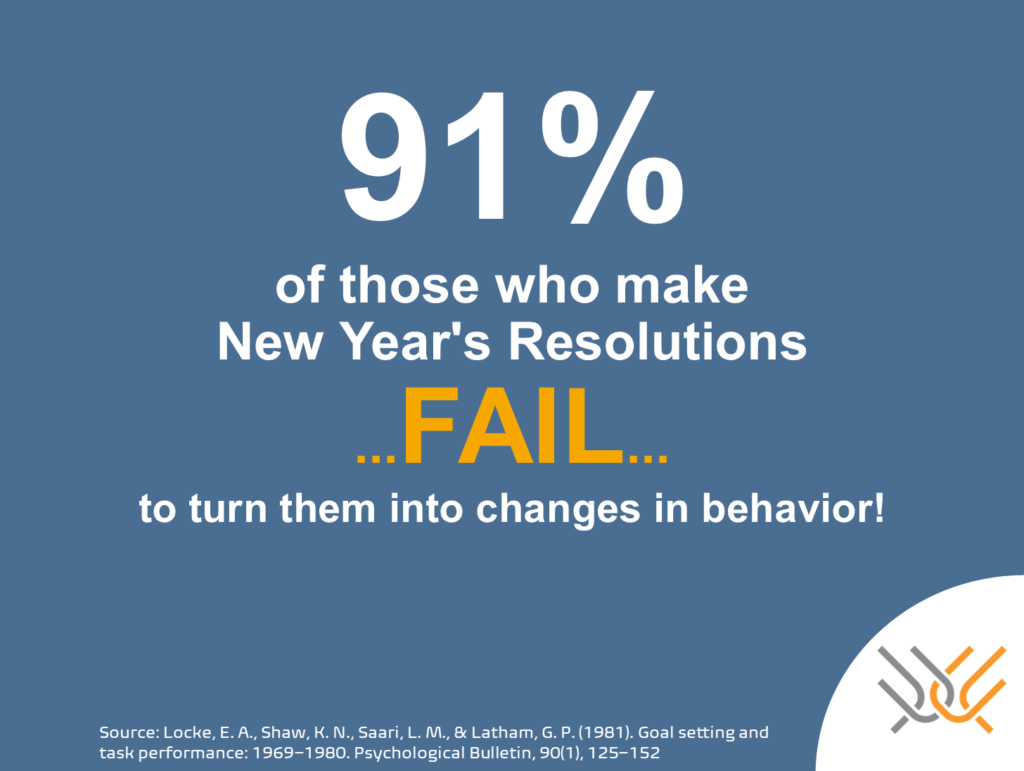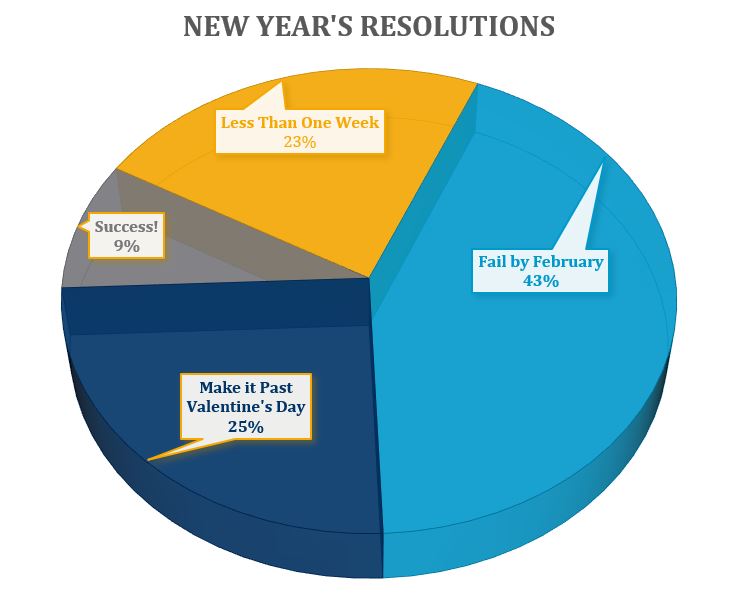 Every year, millions of people make New Year’s resolutions, hoping they result in positive change. Yearly, the themes include a more active, regular approach to health and fitness, weight loss, improved finances, and learning new things for both personal and professional development. Chances are, more than a couple of the top 10 most common resolutions will look familiar to you:
Every year, millions of people make New Year’s resolutions, hoping they result in positive change. Yearly, the themes include a more active, regular approach to health and fitness, weight loss, improved finances, and learning new things for both personal and professional development. Chances are, more than a couple of the top 10 most common resolutions will look familiar to you:
- Exercise more
- Lose weight
- Get organized
- Learn a new skill or hobby
- Live life to the fullest
- Save more money / spend less money
- Quit smoking
- Spend more time with family and friends
- Travel more
- Read more
Challenge:
Yes, it is a great practice to make resolutions. This yearly exercise gives us a regular way to look forward to the new year with optimism that is active, rather than passive. We have a choice to live our lives proactively or reactively. Proactive living, at home and at work, is the more productive route because it puts us each in a place of control. Proactive leadership is a proclamation of how you want the new year to be better – for you, your team and your company – and how you’re going to take the reins and actually make it happen.
Psychological Principle:
Most people fail when it comes to making New Year’s resolutions actually turn into actionable, productive habits that result in lasting changes in both mindset and behavior. Often, resolutions are too generic and/or too grandiose. Also, most people don’t put a plan in place that involves any way of measuring success. This year, look at your leadership role and set some firm, measurable goals that you can actually track and achieve. According to a study published in the Journal of Clinical Psychology, only 46% of people who made New Year’s resolutions were successful at turning them into healthy habits that stuck around.
 According to the U.S. News & World Report, 80% of New Year’s resolutions fail by February.
According to the U.S. News & World Report, 80% of New Year’s resolutions fail by February.
The “father of Positive Psychology,” Martin Seligman, has said that “New Year’s resolutions should be instead about looking at the past year, doing a self-review and seeing which areas of life to improve.” They shouldn’t cause stress and shouldn’t be made out of pressure or obligation. Seligman says to write out the specific steps needed to meet resolutions.
Below are some suggestions on how to shift your mindset and behavior around New Year’s resolutions. Let these tips help yours stick way past Valentine’s Day, resulting in real changes in mindset and behavior!
Mindset Shift:
- Work and life are blended together – Everyone is concerned about health, and losing weight is one of the most common New Year’s resolutions out there. You spend a lot of time at work, so consider what you can do for your health while you’re there.
- Learn a new skill – Awesome leaders are not satisfied where they are. They crave learning new things. No matter what field you are in, there are hundreds of new skills you can learn that could benefit your career and your personal life. If it can enhance your work in your current job, your company might even be willing to pay for it.
- Read one career-related or motivational book – Reading does wonders for your mind. No matter your role, there is a book out there that can improve your performance, your outlook, or your personal habits. Check out Chris’ book.
- Make one new professional connection per month – There’s no downside to increasing the strength of your professional network. You meet people all the time, but do you take the time to listen, grab their business card, and connect with them on LinkedIn?
- Volunteer your time to increase gratitude – Volunteering has many benefits and is a great way to positively affect the world, and it’s also another way you can feel good about yourself. Find a cause that is meaningful to you and sign up to contribute. Involve your work team!
Performance Shift:
- Do some winter cleaning – Clean out your physical and digital file cabinets. This New Year’s resolution idea can double as one for home too! Many of us have file cabinets that are filled with old papers that are not remotely relevant to our work anymore. It doesn’t take long to clean them out, and you’ll be glad you did. Weed through those files, recycle what you don’t need, and organize the rest. This goes for your computer files, too.
- Sign up to follow one relevant blog and/or podcast – There is a world of free information, insider tips, and great motivational writers online. Find a blog that you enjoy, whether it’s specific to your industry or just someone who puts a little pep in your step, and sign up to follow it. Don’t know where to find one? Ask around the office. If you find one your co-workers like, it also becomes a topic for conversation. Win-win!
- Find a work mentor – The right mentor can be a powerful tool to propel your career forward. Is there a person at your company who you highly respect? Don’t just look up to them. Ask if he or she is willing to be your work mentor.
- Send at least one thank-you note per month – Sending a handwritten thank you is a great way to show your appreciation and professionalism. Buy a box of thank-you notes that you like. Then, each month, think of someone who did something nice for you.
- Clean out your email inbox – Organize your email files, sort those emails, and delete what doesn’t need to be there anymore. You’ll feel a little bit lighter every time you log in.
Turning your lofty New Year’s resolutions into smaller goals will increase your chances of success. Think three things when writing your goals: realistic, positive, and specific. Having a coach who keeps you accountable for what you want out of life and your career is a game changer for 2023. Reach out to Chris and our team to see how we can help you!
Follow Chris on Social Media!














0 Comments